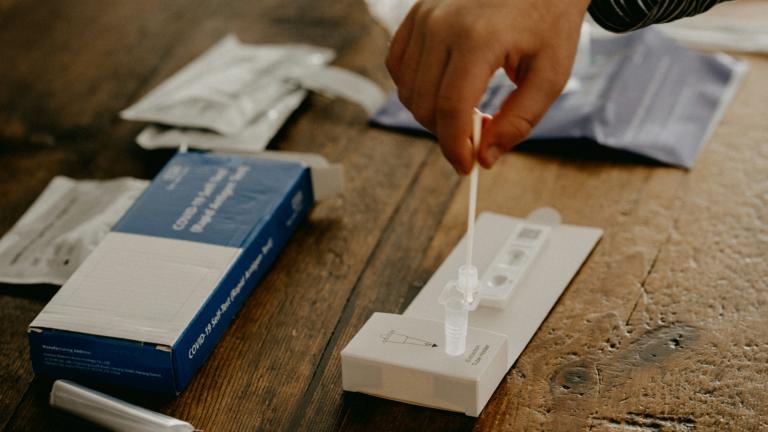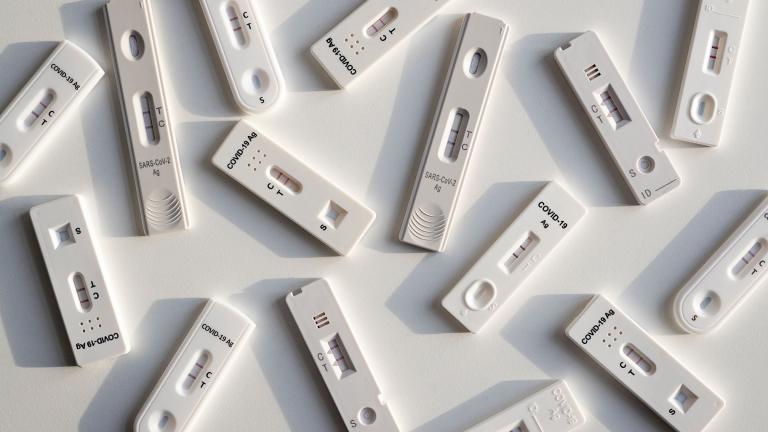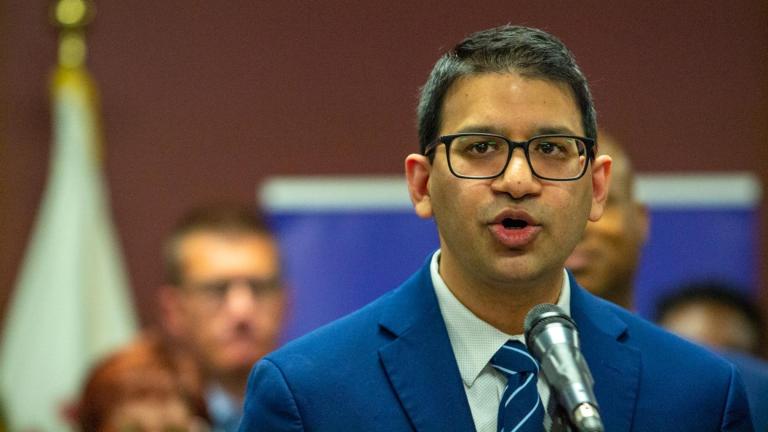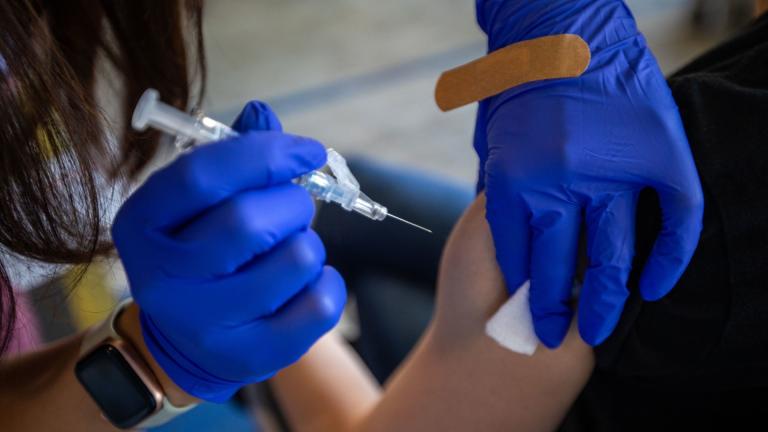Video: Infectious disease specialist Dr. Emily Landon weighs in on the J&J vaccine on “Chicago Tonight.” (Produced by Blair Paddock)
The Illinois Department of Public Health, the Chicago Department of Public Health and the Cook County Department of Public Health will stop administering the Johnson & Johnson vaccine while federal officials review data involving six cases of a rare and severe type of blood clot in individuals who got the one-dose vaccine, officials announced Tuesday.
State health officials said they were acting “out of an abundance of caution” and ordered all Illinois COVID-19 vaccine providers throughout the state to discontinue use of the J&J vaccine until more information is available.
Those who have received the J&J vaccine and develop a severe headache, abdominal pain, leg pain or shortness of breath within three weeks should seek medical care, state health officials said.
To avoid appointment cancellations, state officials “strongly” advised providers to use Pfizer-BioNTech and Moderna vaccines, which use a different mechanism to protect against COVID-19.
The Cook County Department of Public Health will also stop administering the Johnson & Johnson vaccine, which will result in some appointments being canceled, spokesperson Tom McFeeley said. The county was scheduled to offer the J&J vaccine at its Tinley Park mass vaccination site along with the Moderna vaccine.
Cook County had expected to release 35,000 appointments on Tuesday for its mass vaccination sites, but released just 27,000 because of the federal warning about the J&J vaccine, Cook County Health and Hospital System CEO Israel Rocha said at the opening of a new facility in Matteson.
Chicago Department of Public Health Commissioner Dr. Allison Arwady sought to calm fears during an online question-and-answer session and a news conference that the rare but severe side effects meant the Johnson & Johnson vaccine — or others — were not safe.
“I know it is very scary,” said Arwady, who added that her confidence remains unshaken in the safety of the vaccines.
No cases of blood clots tied to the J&J vaccine have been reported in Chicago, city health officials reported.
All of the severe blood clots occurred in the brains of women age 18-48 and developed between six and 13 days after vaccination, with a median appearance of nine days, according to federal officials. The clot was complicated by each of the women developing a low platelet count and the fact that common anticoagulants such as heparin made their conditions worse, according to federal officials.
Those who recently got the Johnson & Johnson vaccine “should not be severely worried,” but should closely monitor their heath, Arwady said.
Moderna and Pfizer vaccines make up the vast majority of doses on hand in Illinois, according to state health officials. Those vaccines use a completely different technology, officials said.
Illinois received 17,000 doses of the Johnson & Johnson vaccine this week. Starting Sunday, the state expects to receive another 483,720 vaccine doses, including 5,800 doses of the J&J vaccine.
Chicago receives a separate shipment of vaccine from the federal government and expected 4,800 doses of the Johnson & Johnson vaccine this week, Arwady said. During the previous week, Chicago got 39,900 doses of the one-dose vaccine, she added.
Approximately 13,000 doses of the Johnson & Johnson vaccine are now on hold and will not be administered as scheduled, Arwady said.
In all, more than 47,000 Chicagoans have gotten a J&J vaccine since federal officials cleared it for use, Arwady said.
City officials intended to administer approximately 13,000 doses in the city this week. Those are on hold and being rescheduled, Arwady said.
Gov. J.B. Pritzker announced Tuesday afternoon that the state would send 50,000 doses of the Moderna and Pfizer vaccines to Chicago to make up for the shortfall caused by the pause in administering Johnson & Johnson vaccine. An additional 50,000 doses will be available for the second of the two-dose vaccine in three or four weeks, he said.
Pritzker received the Johnson & Johnson vaccine on March 24 and has not reported any side effects.
Chicago officials have no choice but to suspend its program to vaccinate homebound seniors because of the suspension of the J&J vaccine, Arwady said.
In addition, efforts to use the J&J vaccine to vaccinate union members at the mass vaccination site visited last week by Vice President Kamala Harris as well as several vaccination events planned to inoculate restaurant and hotel workers have been suspended.
“This is a hit, no doubt about it,” Arwady said. “The timing is bad.”
Instead of offering the J&J vaccine at the mass vaccination site at Chicago State University, the city will offer the Pfizer vaccine, Arwady said.
Mayor Lori Lightfoot’s office announced Sunday that the mass vaccination site at the United Center would switch from the Pfizer vaccine to the Johnson & Johnson vaccine on April 20, saying there was a “high demand from residents for the single-shot COVID-19 vaccine from Johnson & Johnson.”
No new walk-in appointments will be booked at the United Center, Chicago Department of Public Health officials announced late Tuesday, while Pfizer vaccination will continue this week.
“I expect not just in the city but across the country, we'll see some drop in the rate of vaccinations as a result of this,” Arwady said.
The interruption of the vaccination effort comes at a time when COVID-19 cases have been rising steadily in Chicago for several weeks.
An average of 691 Chicagoans have been diagnosed each day with the coronavirus during the past week, an increase of 15%, and the city’s test positivity rate has risen from 5.1% to 5.7% during the past week, according to city data. A test positivity of 5% or more indicates the virus is spreading unchecked, officials said.
Hospitalizations and admissions to intensive care units are also rising, and the surge in cases remains concentrated in North Side neighborhoods, Arwady said. In recent days, cases are no longer rising fastest among White Chicagoans, but are now rising among Black and Latino Chicagoans, she added.
Black and Latino Chicagoans are also more likely to be hospitalized, Arwady said.
Arwady said Chicago’s vaccination effort continues to go well but added that it gives “her a lot of pause” that less than 62% of Chicagoans older than 65 have gotten at least the first dose of the vaccine, according to city data. Just 47.4% of Chicago seniors have gotten both doses, according to city data. That lags statewide efforts, according to state and city data.
In all, 46% of adult Chicagoans have gotten at least one dose of the vaccine, while approximately 25% of all adult Chicagoans having gotten two doses, according to city data.
Contact Heather Cherone: @HeatherCherone | (773) 569-1863 | [email protected]








